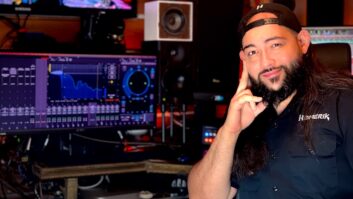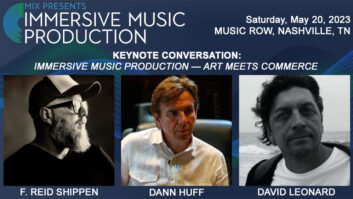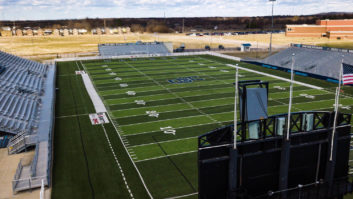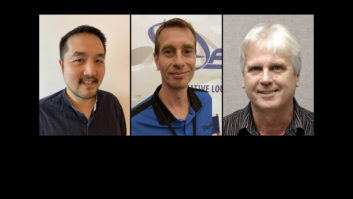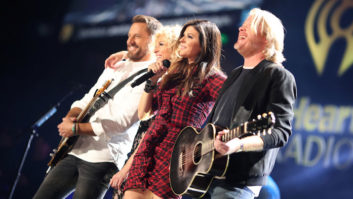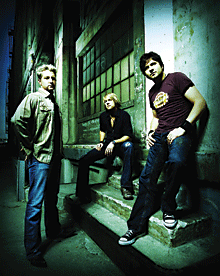
Some Rascal Flatts stats:
- Bassist Jay DeMarcus, vocalist Gary LeVox and guitarist Joe Don Rooney’s latest CD, Me and My Gang, produced by Dann Huff, was certified Platinum within two weeks of its release.
- It’s the highest-selling country title so far for 2006.
- It debuted at Number One on the Billboard Top 200 albums chart, making it the highest-selling CD across all genres.
- “What Hurts the Most,” the first single from the new album, was Rascal Flatts’ fastest-rising single yet.
- All totaled, the Rascal Flatts catalog, which includes Feels Like Today (2004), Melt (2002) and Rascal Flatts (2000), has sold more than 10 million albums.
- In 2005, Rascal Flatts were re-crowned ACM, ASCAP, CMA and CMT Vocal Group of the Year. They were also named Billboard and Radio & Records Artists of the Year and Breakthrough Touring Act at the Billboard Touring Awards, besting Coldplay.
- Rascal Flatts spent 10 weeks at Number One on the radio singles charts in 2005, making them the year’s most-played artists on country radio.
From left: singer Gary LeVox, guitarist Joe Don Rooney and bass player Jay De Marcus
So, to paraphrase an age-old Passover question, what makes this group different from every other group? According to Joe Don Rooney, it’s luck, plain and simple. “I have buddies who can play circles around me and they can’t get a break,” he says. “In my eyes, we’re living a dream and we’re lucky to have people who believe in us. I feel for artists who don’t have the right core group of people behind them. I wish everyone could experience what we’re experiencing. We’re truly blessed.”
Joe Don Rooney — a country star name if ever there was one — uses the word “blessed” repeatedly throughout a conversation and never does it sound rehearsed or contrived. Perhaps that’s part of the secret behind Rascal Flatts’ success: Nothing this trio does sounds contrived. Rehearsed, yes — almost to perfection, with LeVox’s instantly recognizable voice giving them something most of today’s groups lack: identity. But despite the rock and pop flavorings behind the country licks and lyrics, Rascal Flatts is anything but formulaic. They’re seasoned musicians, multi-instrumentalists, an energetic, tight live act and studio professionals.
That’s not bad for a band that came together almost by accident. DeMarcus relocated to Nashville in 1992, with his cousin LeVox joining him shortly after. While DeMarcus produced and toured with Christian artists, opportunity knocked to join Chely Wright’s band. Between tours, he and LeVox had their own three-piece playing Nashville clubs. In the meantime, Rooney was hired into Wright’s band. Filling in for DeMarcus and LeVox’s guitarist one night for a three-piece club gig, they all realized they were onto something, and Rascal Flatts was born.
“It’s been a long path,” says Huff of his working relationship with the band. “I knew them when they first started; I played some guitar solos on their records. Even though it has been a dream of mine to work with them, they’re friends, and you don’t do that. Ironically, with all the success they’ve had, they needed to shake it up, and when they asked if I would produce this record, I thought about it for five seconds and said, ‘Yes!’”
Huff spent some time on the road with the group, beginning in 2004. “I wanted to make that translation between live and studio,” he says. “They have a bit more of a rock show, and I wanted to bring that energy and push them to flex their musical muscles. Once I adjusted my ears to a level above the screaming of the crowds, I was able to hear exactly what they were doing.”
Me and My Gang was two years in the making, and while Huff is calm in describing the joint effort, Rooney expresses disbelief. “We’re huge fans of Dann,” he says. “As a guitar player, he’s one of my heroes. He really got it as to what we needed to do. He stole our hearts. There was so much energy in the studio with him. The first day, my nerves were shot: ‘I’m working with Dann Huff!’
“From day one, we had this belief in him, and he fully reciprocated,” Rooney continues. “He built us up and made us look at ourselves in ways we never had before. He’s a true musician, composer and artist, and he knows how he wants it to sound. Doing guitars with him — we spent two or three weeks just on guitars, amps, cabinets, arrangements. Sitting in the control room with him was awesome. Dann will go on until he gets it right. He’s so passionate and patient, and it’s the perfect mix to be the type of producer he is.

“I can listen to all four of our records and hear the differences and what Rascal Flatts has to offer — our personalities as musicians and vocalists. We’re so proud of this CD — the blood, sweat and tears in it — and it’s such a blessing to do this for a living. My God, we’re so lucky! As a kid, I would sit in my bedroom and read the liner notes on every album. Matt Rollins, Brent Mason and Dann Huff were on everything. I came to Nashville scared to death and challenging myself to be the best I could be. I never had a clue I would ever work with Dann; I just wanted his autograph! Now he’s a friend, soul mate and therapist. He’s a great musician and producer, a great husband and father, and human being.”
While Huff says it makes him laugh to hear Rooney’s comments about “the fourth Flatt,” he is obviously humbled. “When I ratcheted it up and said, ‘Go,’ they were tireless,” he says. “A producer really appreciates that. I was just looking for performances. I watched them play live, I heard the great riffs, Joe Don’s blues background, and it was a pleasure to sit there in the studio and basically say, ‘Joe Don, this is you; it’s your thing, just do it.’ The same with Jay. I said, ‘Why let anyone else play the solos?’ They haven’t received the respect due to them yet as musicians.”
Making the record offered some moments of stress, despite the band’s track record and the fact that, well, he’s Dann Huff! “There were a couple of sleepless nights,” he admits, “because if it tanked, if I changed one thing and it went to hell in a handbasket…A lot of what I do is just listen. I ask the artist, ‘What do you want to be about? I’ll put in my opinion, but how can I help you?’ I’m a partner, and my job is almost enabling the artist to be what they want to be.”
Me and My Gang started at the Sound Kitchen in Nashville, where it was also mixed by top engineer Justin Niebank, whom Huff notes “usually has five songs in the Top 10 on the country charts at any given time.” Some tracking took place at Masterfonics and Blackbird, where some of the mixing was also done. Says Niebank, “I tracked a lot of the record, and they mixed a song a day, using Pro Tools through an SSL 9000K and mixed to half-inch analog.” LeVox did some vocals at Huff’s home studio, where the key piece of equipment is stashed. “I do 90 percent of my listening at home through a $100 Sony jam box,” says Huff. “I listen at very low volume. If somebody reads this, they can now do everything I do right there!

Rascal Flatts’ dynamic mixing duo: producer Dann Huff (left) and engineer Justin Niebank.
“I love spontaneity in the studio, and sometimes having too many options cuts down on that. I noticed when I was a studio player that they’d always ‘try another mic’ and everything I felt I had was changed 30 minutes later. When the spirit moved, so to speak, that was it. So I used a [Neumann] 269 for all the vocals on this album. I used Tube-Tech compressors and Focusrite Liquid Channels. All the engineers scoff at them, I guess because they’re not tubes. I used Pro Tools, and the guitars were miked with [Shure] 57s and Royers. It was mixed on an [SSL] K Series.
“I’m 45; I’m not a spring chicken. I’ve been recording since I was 18 and I was never that interested in the technical side, even with guitars. If that was the [mic] in the room, that’s what I used. I try to keep things pretty basic. I had several engineers. Mark Hagen did 95 percent of the overdubs; he goes project to project with me. I had Justin Niebank, Jeff Balding, Steve Marcantonio and Mills Logan. We had so many different tracking dates because the band was on tour, and that’s fine because I love working with different people. I try to make it part of what I do. Everybody has their favorites, but I like to say that I don’t have to work in any particular studio or with a certain engineer or musician to get what we need. The 20-year-old kid who has never been in a studio before is as valid as a seasoned vet. You look for different things.”
“There are producers whose idea of making a record is to sit on the couch and tell you it’s great, while the engineer presses the faders and compressors,” says Rooney. “Dann has the monitors, the Pro Tools, the board, the console in front of him. He’s doing it all, hands on, making it right with you. He gives you the creative freedom to pull off those licks and find the right parts and the right notes. Sure, it was nerve-wracking to play in front of him, and I screwed up a bunch, but when you nail it and he says, ‘Awesome!’ and his eyes sparkle, it’s a beautiful thing. He’ll give you an angle no other guitar player could come up with. It’s a gift he has to find the perfect melody and take it somewhere. I know that he made us all better players and better thinkers.”
